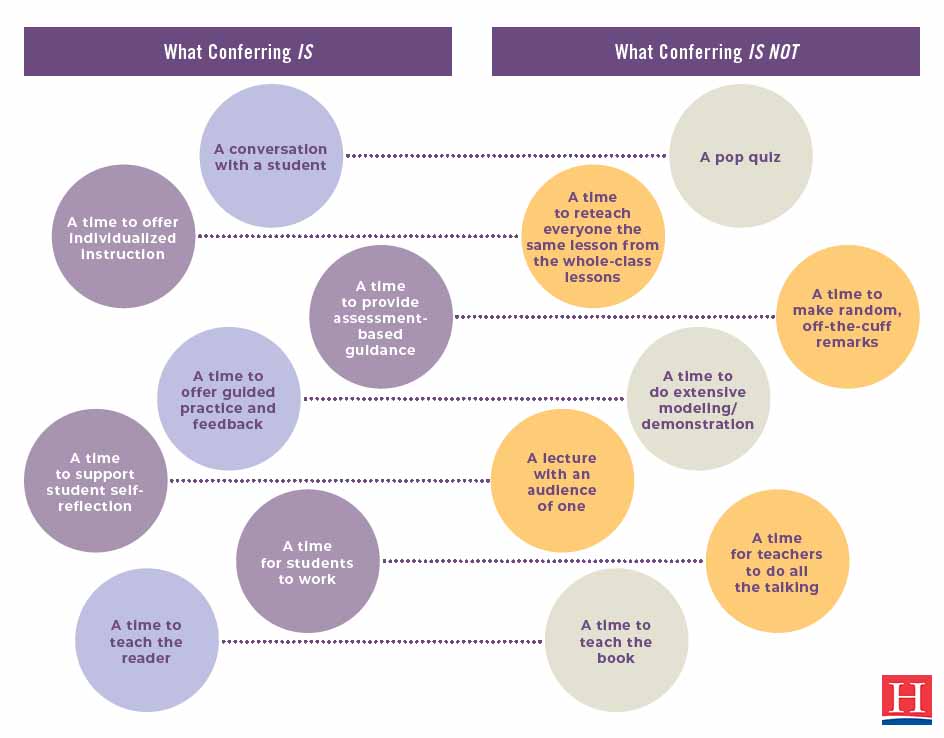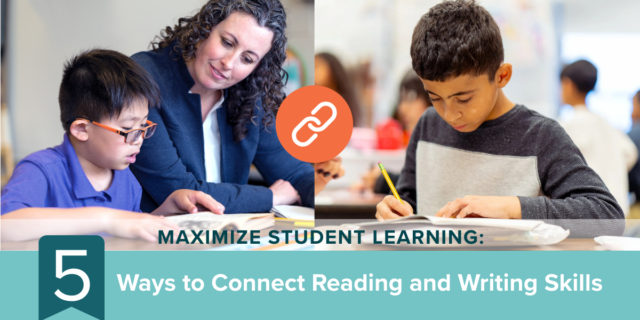
The following has been adapted from Jennifer Serravallo's forthcoming book A Teacher's Guide to Reading Conferences.
When you confer, you tailor your instruction to each student’s strengths and needs. But you do so much more than that. Conferring is where the magic happens. It’s the heartbeat of the literacy block. Conferring blurs the lines between teacher and student; you become a researcher as you learn about your students, and they learn from you (Morrell 2012; Freire 1998).
Conferring helps teachers do the important work of seeing the rich and beautiful variety of individual students in the classroom, and to honor and cherish where each student is with their learning (Paley 2000). When you work one-on-one or in small groups with students, it allows you to value each child's language and literacy practices, and their own literacy development (Ladson-Billings 2009; Souto-Manning and Martell 2016). In reading conferences, you give a student or group of students your undivided attention, and develop strong relationships with them.

There are a variety of types of individual and small-group conferences, each with a unique structure and purpose and consistent student and teacher roles. During conferences, students are expected to self-reflect, show what they've learned, ask for support, and practice strategies. Teachers offer new strategies or support for ones still being practiced, give feedback, and guide readers.
Where Do We Find Time for Conferring?
When you're conferring with your student or group of students, what is the rest of the class doing? The short answer? Reading. Sure, you could keep the rest of the class busy with other literacy-related activities while you confer, but the most meaningful (and enjoyable!) thing students can be doing is engaging with texts of their own choosing. Instead of spending time at the Xerox machine running off worksheets or spending countless hours creating materials for centers, get books in students’ hands and let them read. Once students are set up with books, comfortable reading spots, and uninterrupted time, you can be free to pull small groups and/or to work with students one-on-one.
In A Teacher's Guide to Reading Conferences, Jen recommends trying to check in with each of your students and support their individual reading goals twice a week, somehow. It could be in a small group and a conference, two small groups, two conferences. A good model to start with for a class of twenty-five students is trying to meet with ten students a day (25 kids x 2 times a week = 50 kids a week ÷ 5 days in a week = 10 students a day).
With this ten-a-day aim in mind (adjusted for class size) you'll be able to build students' stamina and set them up to read and practice their strategies independently for a sustained block of time, all in a time-efficient and student-centered approach.
…
Learn more about A Teacher's Guide to Reading Conferences and place your pre-order at Heinemann.com
 Follow us on Instagram @heinemannpub to stay up to date on the latest books, your favorite authors, and upcoming events
Follow us on Instagram @heinemannpub to stay up to date on the latest books, your favorite authors, and upcoming events

Jennifer Serravallo is the author of the New York Times bestseller The Reading Strategies Book and The Writing Strategies Book, which have been translated into Spanish, French, and Chinese. These and her other popular books and resources help teachers make goal-directed responsive strategy instruction, conferring, and small group work doable in every classroom. Her newest titles are Teaching Writing in Small Groups, A Teacher’s Guide to Reading Conferences, Understanding Texts and Readers, and the assessment and teaching resource Complete Comprehension for Fiction and Nonfiction.
Jen is a frequently invited speaker at national and regional conferences and travels throughout the US and Canada to provide full-day workshops and to work with teachers and students in classrooms. She is also an experienced online educator who regularly offers live webinar series and full-day online workshops, and is the creator of two self-paced asynchronous online courses, most recently Strategies in Action: Reading and Writing Methods and Content.
Jen began her career in education as an NYC public school teacher. Now as a consultant, she has spent the last fifteen+ years helping teachers across the country create literacy classrooms where students are joyfully engaged, and the instruction is meaningfully individualized to students' goals. Jen is also a member of Parents Magazine Board of Advisors for education and literacy.
Jen holds a BA from Vassar College and an MA from Teachers College, where she has also taught graduate and undergraduate classes.
Learn more about Jen and her work at Hein.pub/serravallo, on Twitter @jserravallo, on Instagram @jenniferserravallo, or by joining The Reading and Writing Strategies Facebook Community.




